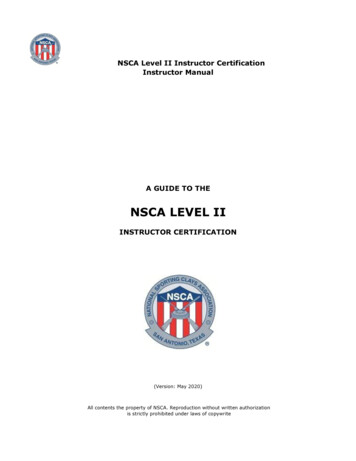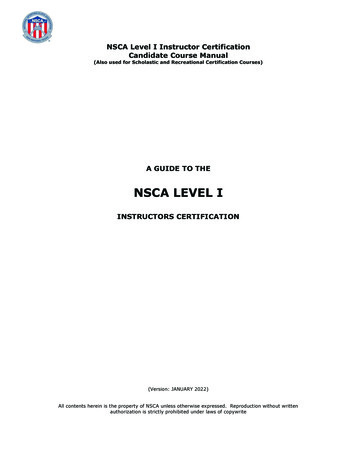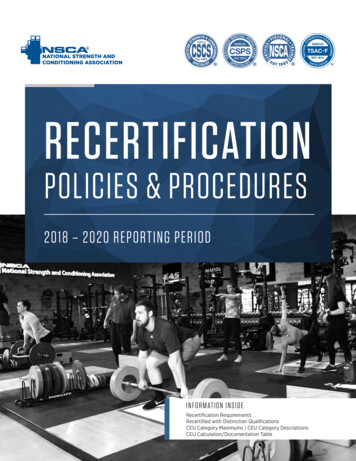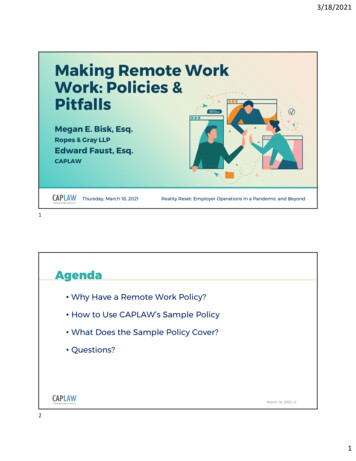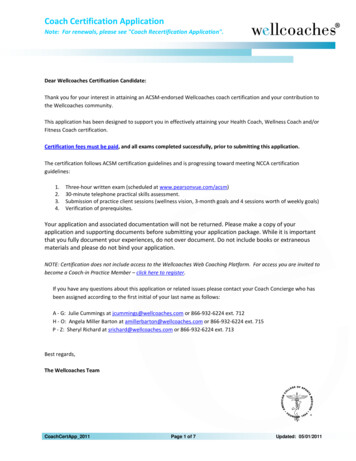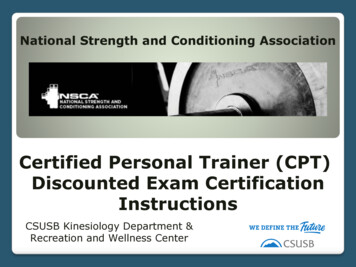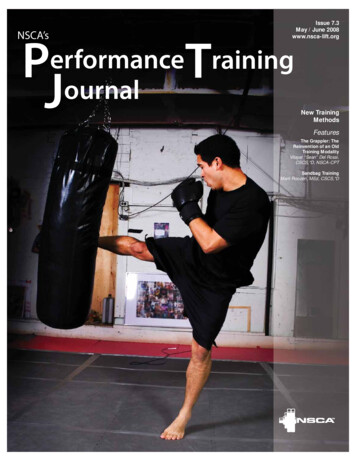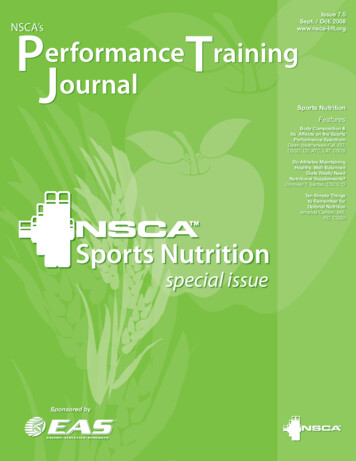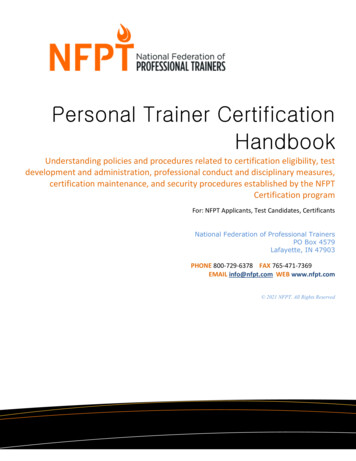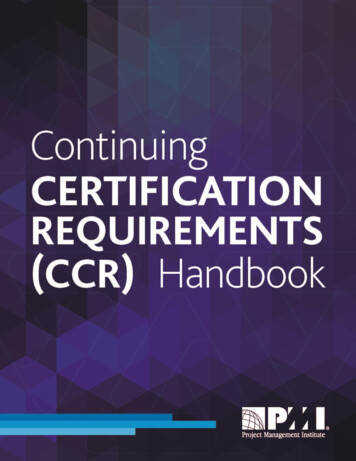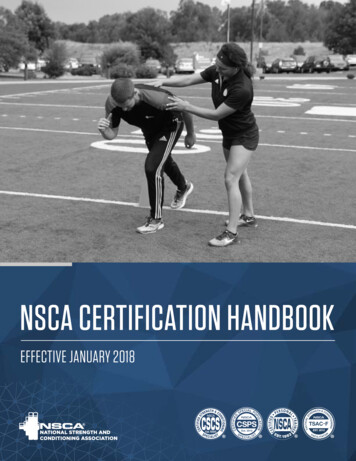
Transcription
NSCA CERTIFICATION HANDBOOKEFFECTIVE JANUARY 2018
NSCA Certification HandbookABOUT THIS HANDBOOKThis handbook was developed to provide the information needed to earn and maintain certifications through the NSCA.Certification candidates and certificants are expected to become familiar with and abide by the certification policies andrequirements as set forth in this handbook.NSCA Certification Handbook NSCA.com2
TABLE OF CONTENTSINTRODUCTION5Exam Fees18About the Association6Scheduling an Appointment18Certifications Offered6Test Center Locations18Accreditation of NSCA Certifications6Exam Authorization Period18Registration of NSCA Certifications7Changes to Contact Information18Statement of Nondiscrimination7Name18ABOUT THE EXAMS8Contact Information and Communications18Job Analysis9Registration Withdrawal and Refunds18Item Writing9Cancelling and Rescheduling Exam Appointments19Standard Setting9Late Arrival and No-Show19Exam Content Outlines9Late Arrival19CSCS9No-Shows19CSPS10Inclement Weather, Power Failure, or EmergencyNSCA-CPT10EXAM DAYTSAC-F10Candidate ID Requirements2111Security21Example Preparation Plan Options11Personal Belongings21Plans Recommended by Background11Items Not Permitted21CERTIFICATION ELIGIBILITY12Permitted Items21Eligibility Requirements13Comfort Aids22CSCS13Permitted Medicine and Medical Devices22CSPS13Permitted Mobility Devices22NSCA-CPT13Exam Supplies22TSAC-F13Questions and Comments About Exam Content22Acceptable Accreditation of Collegesand Universities13Breaks22Leaving the Exam Early22Exercise Science-Related Fields13Exam Misconduct23Acceptable CPR/AED Certifications14Exam Results23Discipline Policy and Certification Appeals14Exam Scoring23EXAM REGISTRATION PROCESS15Exam Pass Rates23Completing the Registration Form16Confidentiality of Results23Release of Information16Cancelled Scores23Affirmation16Awarding of Certification23Special Accommodations16Retake Policy23Eligibility Documentation17Appealing Exam Results23Exam Preparation1920Academic Transcripts (CSCS and CSPS only)17Privacy Policy23CPR/AED Certifications17Appealing Exam Results23Practical Experience (CSPS only)17NSCA Certification Handbook NSCA.com3
TABLE OF IONAL CANDIDATES26International Candidates27APPENDICES28Appendix A: Certification Checklist29Appendix B: Special AccommodationsRequest Form30Appendix C: Practical Experience Form32Appendix D: Registration Affirmation33Appendix E: Codes, Policies, and Procedures34Appendix F: Recertification Policiesand Procedures44Appendix G: CSCS Detailed Content Outlinesand Sample Questions51Appendix H: CSPS Detailed Content Outline andSample Questions59Appendix I: NSCA-CPT Detailed Content Outlineand Sample Questions66Appendix J: TSAC-F Detailed Content Outline andSample Questions71Copyright 2018. National Strength and ConditioningAssociation (NSCA). All rights reserved. No part of thispublication may be reproduced or transmitted in any form orby any means, electronic or mechanical, including photocopyor recording, or any information and retrieval system,without written permission from The NSCA.NSCA.com Toll Free 800-815-6826Fax 719-632-6367 international 1-719-632-6722NSCA Certification Handbook NSCA.com4
INTRODUCTIONNSCA Certification Handbook NSCA.com5
ABOUT THE ASSOCIATIONThe National Strength and Conditioning Association(NSCA) was founded as the National Strength CoachesAssociation in 1978 by a group of strength coaches whoshared a desire to network, collaborate, and unify theprofession. In 1979, the NSCA was incorporated as anonprofit 501(c)(3) charitable and educational organization.The NSCA established the CSCS Agency in 1985 (laterknown as NSCA Certification Commission) to developand administer a certification program for strength andconditioning professionals. In 2008, the NSCA CertificationCommission responsibilities were integrated into theNSCA under the direction of the Certification Committee.Today, the NSCA has a membership of approximately26,000 exercise professionals, and approximately45,000 individuals actively certified through one of fourcertification programs.The NSCA is widely regarded as the worldwide authorityon strength and conditioning. The NSCA’s mission is tosupport and disseminate research-based knowledge andits practical application to improve athletic performanceand fitness. The NSCA publishes two of the world’spremier journals in strength and conditioning: Strengthand Conditioning Journal (SCJ) and Journal of Strengthand Conditioning Research (JSCR). These and other NSCApublications bridge the gap between theory and practice bylinking what is being learned in the sport science researchlaboratories to what is being taught by fitness professionals.CERTIFICATIONS OFFERED Certified Strength and Conditioning Specialist (CSCS ). The CSCS program was created in 1985 torecognize individuals who possess the knowledgeand skills to design and implement safe and effectivestrength and conditioning programs for athletes ina team setting. Certified Strength and ConditioningSpecialists are professionals who apply scientificknowledge to train athletes for the primary goal ofimproving athletic performance. They conduct sportspecific testing sessions, design and implement safe andeffective strength training and conditioning programs,and provide guidance regarding nutrition and injuryprevention. Recognizing that their area of expertise isseparate and distinct, CSCS certificants consult with andrefer athletes to other professionals when appropriate. Certified Special Population Specialist (CSPS ). TheCSPS program was created in 2012. Certified SpecialPopulation Specialists are fitness professionals who,using an individualized approach, assess, motivate,educate, and train special population clients of all agesregarding their health and fitness needs, preventively,and in collaboration with healthcare professionals.Special populations include those with chronic andtemporary health conditions. CSPS certification holdersdesign safe and effective exercise programs, providethe guidance to help clients achieve their personalhealth and fitness goals, and recognize and respond toemergency situations. Recognizing their own areas ofexpertise, CSPS professionals receive referrals from andrefer clients to other healthcare providers as appropriate. NSCA-Certified Personal Trainer (NSCA-CPT ). Asthe fitness industry continued to grow, the NSCA sawa need for a prestigious and credible personal trainingcertification and established the NSCA-CPT programin 1993. NSCA-Certified Personal Trainers are healthand fitness professionals who, using an individualizedapproach, assess, motivate, educate, and train clientsregarding their health and fitness needs. Certifiedpersonal trainers design safe and effective exerciseprograms, provide the guidance to help clients achievetheir personal health and fitness goals, and respondappropriately in emergency situations. Recognizingtheir own area of expertise, NSCA-CPT certificantsrefer clients to other healthcare professionalswhen appropriate. Tactical Strength and Conditioning Facilitator (TSAC-F ). Tactical Strength and ConditioningFacilitators apply scientific knowledge to physicallytrain military, fire and rescue, law enforcement,protective services, and other emergency personnel toimprove performance, promote wellness, and decreaseinjury risk. They conduct needs analyses and physicaltesting sessions, design and implement safe andeffective strength training and conditioning programs,and provide general information regarding nutrition.Recognizing their area of expertise is separate anddistinct, TSAC-F certificants consult with and referthose they train to other professionals when appropriate.ACCREDITATION OFNSCA CERTIFICATIONSNSCA strongly believes in adhering toindustry best practices and establishedaccreditation standards in the administrationof its certification programs. Both the CSCSand NSCA-CPT certification programs have earnedaccreditation by the National Commission for CertifyingAgencies (NCCA). CSCS earned NCCA accreditation in1993, and was the first nationally accredited strengthtraining and conditioning certification program. In 1996,NSCA Certification Handbook NSCA.com6
the NSCA-CPT became the first certified personal trainerprogram accredited by NCCA. Through the accreditationprocess, NSCA has demonstrated that the CSCS and NSCACPT programs meet or exceed NCCA Standards. NSCA iscurrently in the process of earning NCCA accreditationfor the newly created CSPS and TSAC-F programs. Formore information about NCCA accreditation please ATION OF NSCACERTIFICATIONSCOALITION FOR THEREGISTRATION OF EXERCISESCIENCE PROFESSIONALS(CREP)The NSCA is dedicated toadvocating for strength and conditioning professionalsand advancing their careers. The NSCA is one of fourfounding members of the Coalition for the Registration ofExercise Professionals (CREP). CREP’s mission is to securerecognition of registered exercise professionals for theirdistinct and impactful roles in medical, health, fitness, andsports performance fields, and we believe collaboratingwith CREP will help us in furthering the industry as a whole.CREP is a not-for-profit 501(c)(6) corporation composedof organizations that offer NCCA-accredited exercisecertifications. It was formed for the purpose of advancingand protecting the industry through self-regulation bypromoting best practices, developing industry standards,and educating policy makers.THE UNITEDSTATES REGISTRYOF EXERCISEPROFESSIONALS(USREPS)The United States Registry of Exercise Professionals (USREPS ) is an internationally recognized registry ofexercise professionals in the United States maintainedby CREP. It supports the exercise professional that holdsan NCCA-accredited exercise certification by serving asa clearinghouse for verification by employers, regulatorybodies, and consumers.All CSCS, NSCA-CPT, and TSAC-F certified professionalsin the United States are added to the Registry, andany newly certified professionals will be added oncethey become certified.For more information about USREPS, please visit:www.usreps.org.STATEMENT OF NONDISCRIMINATIONThe NSCA does not discriminate among exam candidateson the basis of race, color, religion, gender, sexualorientation, gender identity or expression, national origin,age, genetic information, disability, veteran status, or anyprotected characteristic.NSCA Certification Handbook NSCA.com7
ABOUT THE EXAMSNSCA Certification Handbook NSCA.com8
The methods used to develop the NSCA certificationexams adhere to the procedures recommended inthe Standards for Educational and Psychological Tests(APA, NCME, AERA; 2014) and other relevant industrystandards, including the Principles for the Validation andUse of Personnel Selection Procedures (SIOP, 2003) andStandards for the Accreditation of Certification Programs(NCCA, 2014). The NSCA certification exams measure acandidate’s knowledge, skills, and abilities (KSAs) comparedto a standard—a predetermined level of competence—established by industry experts. Identifying the appropriateKSAs, writing exam items, and establishing the standardare all critical parts of the exam development process thatensure valid decisions can be made based on exam results.JOB ANALYSISThe NSCA performs a job analysis approximately every fiveyears for each certification program to identify the criticalKSAs needed to perform the job safely and effectively. Theprocess is guided by a Job Analysis Advisory Committee(JAAC) composed of industry experts. The JAAC developsKSA surveys that are sent to a large, representativesample of certificants. The survey data is then analyzedand presented to the JAAC, who uses the data to guidethe creation of a Detailed Content Outline (DCO) for thecertification exam.ITEM WRITINGThe NSCA certification exams are developed by industryexperts serving on Exam Development Committees (EDCs).EDC members are selected based on their expertise asit relates to the DCOs, and are trained in item writingand reviewing by experts in testing and measurement.Before an item can be used on an exam, it is subjectedto EDC review and is pre-tested. Pre-testing allows testdevelopers to gather statistical information about newitems for evaluation purposes without affecting candidatescores. Pre-test items are unscored items that appear onexam forms interspersed among scored items. Statisticalinformation gathered from pre-test items is analyzed todetermine if the items function properly and are ready foruse as scored items.STANDARD SETTINGThe NSCA certification exams are designed to differentiatebetween candidates who meet a standard of competenceand candidates who do not. The standard for an exam (alsocalled the cut-score or passing score) is determined by theEDC through the use of a modified Angoff methodology.This accepted method requires EDC members to evaluateindividual exam items and estimate the proportion ofminimally competent candidates expected to answercorrectly. These estimates are statistically analyzed forconsistency and then aggregated to arrive at the standard.EXAM CONTENT OUTLINESEach certification exam has a DCO that organizes KSAs intomajor domains and subcategories. Below are summariesof the exam content outlines. The full DCOs are presentedin Appendices H through K. Some tasks in a fitnessprofession simply involve recalling facts or applying specificinformation, whereas other tasks require a completeevaluation of a situation. Thus, the NSCA exams containitems of varying levels of complexity.CSCSThe CSCS Exam consists of two sections:1. Scientific Foundations2.Practical/AppliedNOTE: First-time candidates are required to completeboth sections.Scientific FoundationsThe Scientific Foundations section, which is 1.5 hours inlength, consists of 80 scored multiple-choice questions and15 non-scored multiple-choice questions designed to assessa candidate’s knowledge in the areas of exercise science(59 scored questions on anatomy, exercise physiology,biomechanics, etc.) and nutrition (21 scored questions).The full DCO is presented in Appendix G.CSCS SCIENTIFIC FOUNDATIONSEXAM CONTENT OUTLINEDomainPercentof ExamSectionNumber ofQuestionsExercise Science74%59Nutrition26%21Non-Scored Questions-15Total100%95Length ofExam Section1.5 hoursPractical/AppliedThe Practical/Applied exam, which is 2.5 hours in length,consists of 110 scored multiple-choice questions and 15non-scored multiple-choice questions pertaining toprogram design, exercise techniques, testing and evaluation,and organization/administration. There are 30-40 videoand/or image items that assess competencies in exercisetechniques, functional anatomy, and testing procedures. Thefull DCO is presented in Appendix G.NSCA Certification Handbook NSCA.com9
NSCA-CPTCSCS PRACTICAL/APPLIED EXAMCONTENT OUTLINEDomainPercent ofExam SectionNumber ofQuestionsExercise Technique35%38Program Design35%39Organization andAdministration12%13Testing and Evaluation18%20Non-Scored Questions-15Total100%125Length ofExam Section2.5 hoursNSCA-CPT is a 3-hour examination that consists of 140scored and 15 non-scored multiple-choice items. Thereare 25 to 35 video and/or image items that assesscompetencies in exercise techniques, functional anatomy,and testing procedures. The four domains are as follows:1. Client Consultation/Fitness Assessment Section2.Program Planning Section3.Exercise Techniques Section4. Safety/Emergency Issues SectionThe full DCO is presented in Appendix I.NSCA-CPT EXAM CONTENT OUTLINEDomainPercent ofExam SectionNumber ofQuestionsClient Consultation/Assessment25%35Program Planning31%43Techniques of Exercise31%43CSPSCSPS is a 2.5-hour examination consisting of 100 scoredand 10 non-scored multiple-choice items allocatedacross four domains:1. Basic Pathophysiology and Science of Health Status,Condition, Disorder, or Disease2.Client ConsultationSafety, EmergencyProcedures and Legal Issues13%193.Program PlanningNon-Scored Questions-15Total100%1554. Safety, Emergency Procedures and Legal IssuesLength of ExamThe full DCO is presented in Appendix H.TSAC-FCSPS EXAM CONTENT OUTLINETSAC-F is a 3-hour examination consisting of 130 scoredand 20 non-scored multiple-choice items allocatedacross five domains:1. Exercise ScienceDomainPercentof ExamSectionNumber ofQuestionsBasic Pathophysiology andScience of Health Statusor Condition, Disorder, orDisease40%40Client Consultation19%194. Program DesignProgram Planning31%315.Safety, EmergencyProcedures, andLegal Issues10%10Non-Scored Questions--10Total100%110Length of Exam3 hours2.5 hours2.Nutrition3.Exercise TechniqueOrganization, Administration, Testing, EvaluationThe full DCO is presented in Appendix J.TSAC-F EXAM CONTENT OUTLINEDomainPercent ofExamNumber ofQuestionsExercise Science20%26Nutrition10%13Exercise Technique20%26Program Design35%46Organization,Administration, Testing,Evaluation15%19Non-Scored Questions-20Total100%150Length of ExamNSCA Certification Handbook NSCA.com3 hours10
EXAM PREPARATIONThe NSCA offers several optional resources to helpcandidates prepare. These resources can be combined intoa preparation plan that is tailored to the specific needs of acandidate based on their academic background andpractical experience. For specific details regarding thefollowing preparation resources, including pricing andavailability, please visit NSCA.com. Exam Prep Live Clinics NSCA Exam Prep Live Clinicsare taught by qualified and experienced professionalsand are provided at various locations throughout theyear. They range from 1.5 to 3 days in length and includean emphasis on exercise science, hands-on practicalknowledge (or both), depending on the clinic. Textbooks Textbooks and materials with collections ofimportant articles are available to provide a foundationalacademic resource to students and candidatespreparing on their own. Content Description Booklets Content DescriptionBooklets provide expanded topic questions andexamples beyond the DCO provided in this handbook. Practice Questions Practice questions helpcandidates become familiar with the type, scope, anddifficulty of the questions that appear on the NSCAcertification exams. ERP School Programs The Education RecognitionProgram (ERP) identifies college and university degreegranting programs that meet NSCA standards forstrength and conditioning professionals and personaltrainers. ERP schools assist prospective students byaligning course content with content domains coveredin NSCA certification exams.EXAMPLE PREPARATION PLAN OPTIONSOption AOption B Exam PrepLive Clinic Practice QuestionsOption COption D Mentorship Individual Study Individual Study Exam PrepLive Clinic Exam PrepLive Clinic Mentorship Practice Questions Practice QuestionsOption E ERP SchoolDegree Program Exam PrepLive Clinic Exam PrepLive Clinic Practice Questions Practice QuestionsPLANS RECOMMENDED BY BACKGROUNDCandidate BackgroundExercise ScienceRelated Degree*Internship orPractical ExperienceRecommendedPreparation PlanApproximate Length of TimeYesYesA2 to 6 weeksYesNoA or B3 to 6 monthsNoYesC or D4 to 6 monthsNoNoD or E 6 months***Certain NSCA certifications require a college degree.**Length of degree programs vary.NSCA Certification Handbook NSCA.com11
CERTIFICATION ELIGIBILITYNSCA Certification Handbook NSCA.com12
To qualify for an NSCA certification, candidatesmust meet all of the eligibility requirements for thecertification program. The NSCA’s four certificationprograms have different eligibility requirements.Additionally, all candidates and certificants must abide bythe NSCA Codes, Policies, and Procedures (Appendix E),including the Professional Code of Ethics.ELIGIBILITY REQUIREMENTSCSCS1. Bachelor’s degree or higher granted by anaccredited institution, or a degree in PhysicalTherapy or Chiropractic Medicine2.CPR/AED certification3.Passing score on the CSCS Scientific Foundationssection of the exam4. Passing score on the CSCS Practical/Appliedsection of the examCSPS1. Meet a minimum of at least one of thefollowing options:»»Current NSCA certification (e.g., CSCS, NSCACPT, etc.) or NCCA-accredited personaltrainer certificationORTSAC-F1. At least 18 years old2.High school diploma (or equivalent)3.CPR/AED certification4. Passing score on the TSAC-F ExamCandidates must meet the age requirement, if applicable,prior to registering for a certification exam. Otherrequirements must be met within one year of receivinga passing exam score. For example, CSCS and CSPScandidates who have senior standing may sit for the exams.ACCEPTABLE ACCREDITATION OFCOLLEGES AND UNIVERSITIESOnly degrees granted by accredited colleges anduniversities can be used to satisfy the degree requirementsfor the CSCS and CSPS programs. The NSCA recognizesthe following accrediting institutions for U.S. colleges anduniversities as listed by the US Department of Education: Middle States Commission on Higher Education New England Association of Schools and Colleges,Commission on Institutions of Higher Education North Central Association of Colleges and Schools,The Higher Learning Commission Northwest Commission on Colleges and Universities»»Bachelor’s degree or higher granted by anaccredited institution in Exercise Scienceor a related field, (e.g., physical therapy,chiropractic medicine)OR»»Current license as a physical therapist, physicaltherapist assistant, or athletic trainerANDCPR/AED certification3.Practical experience coaching/training individualsfrom special populations (250 hours)4. Passing score on the CSPS Exam3.CPR/AED certification Accrediting Commission of Career Schools and Colleges Distance Education Accrediting Commission Transnational Association of Christian Colleges andSchools, Accreditation CommissionColleges and universities outside the U.S. must berecognized by the Ministry of Education of the countryin which the institution is located.NSCA-CPT1. At least 18 years oldHigh school diploma (or equivalent) Western Association of Schools and Colleges, SeniorColleges and University Commission New York State Board of Regents, and theCommissioner of Education2.2. Southern Association of Colleges and Schools,Commission on Colleges4. Passing score on the NSCA-CPT ExamNSCA Certification Handbook NSCA.com13
EXERCISE SCIENCE-RELATED FIELDSThe NSCA recognizes the following fields of study asrelating to exercise science for the purpose of fulfilling thedegree requirement for CSPS: Athletic Training, Biology,Biomechanics, Chiropractic, Community Health, ExercisePhysiology, Exercise Science, Health Science, HumanMovement Science, Kinesiology, Medicine (e.g., MD, DO),Nursing, Nutrition, Physical Education, Physical Therapy,and Sport Science.ACCEPTABLE CPR/AED CERTIFICATIONSCPR/AED certification ensures that professionals are ableto recognize and respond to cardiopulmonary emergenciesin adults, including in the application of CPR and the useof Automated External Defibrillators (AEDs). AcceptableCPR/AED certifications must include a hands-on skillsperformance assessment.DISCIPLINE POLICY AND CERTIFICATIONAPPEALSThe NSCA Disciplinary Procedures were established as ameans to enforce the NSCA Professional Code of Ethics,thereby protecting the public and integrity of NSCAcertification programs. Consistent with the obligationof candidates and certificants in regards to the NSCAProfessional Code of Ethics, the Disciplinary Proceduresprovide a formal process for submitting complaintsof unethical behavior to NSCA for consideration andinvestigation. The NSCA Professional Code of Ethics and theNSCA Disciplinary Procedures are found within the NSCACodes, Policies, and Procedures (Appendix E), or online atNSCA.com/codes-policies-procedures.Any action taken by the NSCA Ethics Committee affectingthe status of a certified individual may be appealed inaccordance with the procedures outlined in the NSCACodes, Policies, and Procedures (Appendix E).Exam candidates may appeal, exam eligibility requirements,in writing, to the Certification Committee.NSCA Certification Handbook NSCA.com14
EXAM REGISTRATION PROCESSNSCA Certification Handbook NSCA.com15
Exam registration is a simple four-step process: (1) reviewthe exam descriptions and eligibility requirements; (2)select a certification of best fit; (3) register online; and(4) submit eligibility verification documents. The examregistration process is not considered complete until allsteps are met.COMPLETING THE REGISTRATION FORMCandidates are required to apply online for NSCAcertification exams at NSCA.com. Candidates will receivea confirmation email, which will include their assignedcustomer ID number.1. Navigate to NSCA.com2.Log In using your NSCA username and password, orcreate a new account3.Verify profile Information (first and last name mustmatch your ID exactly)4. Click on “Certification” on the top navigation bar,then click on Certification Overview5.Click on the “Register for Exam” link underneath thedesired certificationAFFIRMATIONNSCA exam candidates are required to complete andsubmit an affirmation on the registration form. Affirmationsinclude, but are not limited to, the following: Submitted registration information found to be false willresult in a revoked certification NSCA exam items, certification names, acronyms, andlogos are protected under U.S. copyright law Those who copy and/or distribute proprietary NSCAinformation will forfeit their registration fees and havetheir certification(s) revoked Certificants must comply with recertification policies toretain certification(s) Certificants read and understand the CertificationPolicies contained in this Handbook Candidates and certificants abide by the NSCA Codes,Policies, and Procedures6.Affirm eligibility requirementsThe complete Registration Affirmation can befound in Appendix D.7.Follow on-screen promptsSPECIAL ACCOMMODATIONS8.Request special accommodations (if applicable)9.Affirm reading/understanding theAffirmation StatementThe NSCA complies with the Americans with DisabilitiesAct. To ensure equal opportunities for all qualifiedcandidates, the NSCA will make reasonable testingaccommodations when appropriate. Candidates with adocumented disability that significantly impairs his or herability to arrive at, read, or otherwise complete an NSCAcertification exam, may request special accommodations.Requests for special accommodations must be madeat the time of registration. Candidates must submitrequired supporting documentation using the SpecialAccommodations Request Form available in Appendix B.10. Affirm reading/understanding the CeritifcationPolices, Procedures and Requirements11. Download and read the Certification Handbook12. Read and Agree to Registration Expiration Policy13. Proceed to checkout14. Submit eligibility verification documentation to NSCA(see Eligibility Documentation)RELEASE OF INFORMATIONBoth the NSCA and its testing agency are committed toprotecting the confidentiality of candidate records. For thisreason, exam scores are never released by telephone, or fax,even to candidates. Also, information regarding candidatescores is never released to any third party. Verification ofthe certified status of an individual, however, is providedupon receipt of a written request. Neither the NSCA, nor theNSCA Certification Committee members, or their respectivestaff are involved with the handling or scoring of any examin any way. This is the testing agency’s responsibility.IMPORTANT: Candidates with approved testingaccommodations must call pearson vue at (800) 4660450 to schedule an exam appointment. Candidateswho schedule appointments through any other means(e.G., Online, via a different number) will not have theiraccommodations available at the appointment.NSCA Certification Handbook NSCA.com16
ELIGIBILITY DOCUMENTATIONCandidates have one year to submit documentationdemonstrating completion of all eligibility criteria.Exam results become invalid if acceptableeligibility documentation is not received within oneyear of exam date.It is recommended that all mailed documentation besent in a form that is traceable (e.g., certified USPS, UPS,FedEx). Candidates should retain the tracking informationin case a proof of mailing or receipt is needed. Any and alldocumentation sent to the NSCA will not be returned.NSCAAttn: Certification Department1885 Bob Johnson DriveColorado Springs, CO, 80906 USAACADEMIC TRANSCRIPTS (CSCS AND CSPS ONLY)CSCSCandidates must submit an original, official transcript fromtheir college/university when taking the CSCS exam for thefirst time. Official transcripts are required to be sent directlyfrom the registrar’s office. Transcripts must confirm that thedegree was conferred. Transcripts must be in an envelopewith the registrar’s stamp placed across the envelope flap.Transcripts will not be returned. If candidates mail thetranscript, the registrar’s seal must remain intact. The NSCAalso accepts official electronic transcripts (e-transcripts)that are transferred using a secure document transferprogram (e.g., escrip-safe, eDocs). The documents shouldbe sent to exams@nsca.com.Transcripts with the following are not acceptable: Copy marked “student copy,” “issued to student,” orother similar languageCSPSCandidates must submit original documentation showingattainment of an appropriate personal trainer certification,academic degree, or professional license when taking theCSPS exam for the first time. Official academic transcriptsare required to be sent directly from the registrar’s office.Transcripts must confirm that the degree was conferred.Transcripts must be in an envelope with the registrar’sstamp placed across the envelope flap. Transcripts willnot be returned. If candidates mail the transcript, theregistrar’s seal must remain intact. The NSCA acceptsofficial electronic transcripts (e-transcripts) that aretransferred using a secure
NSCA-Certified Personal Trainer (NSCA-CPT ). As the fitness industry continued to grow, the NSCA saw a need for a prestigious and credible personal training certification and established the NSCA-CPT program in 1993. NSCA-Certified Personal Trainers are health and fitness professionals who, using an individualized
